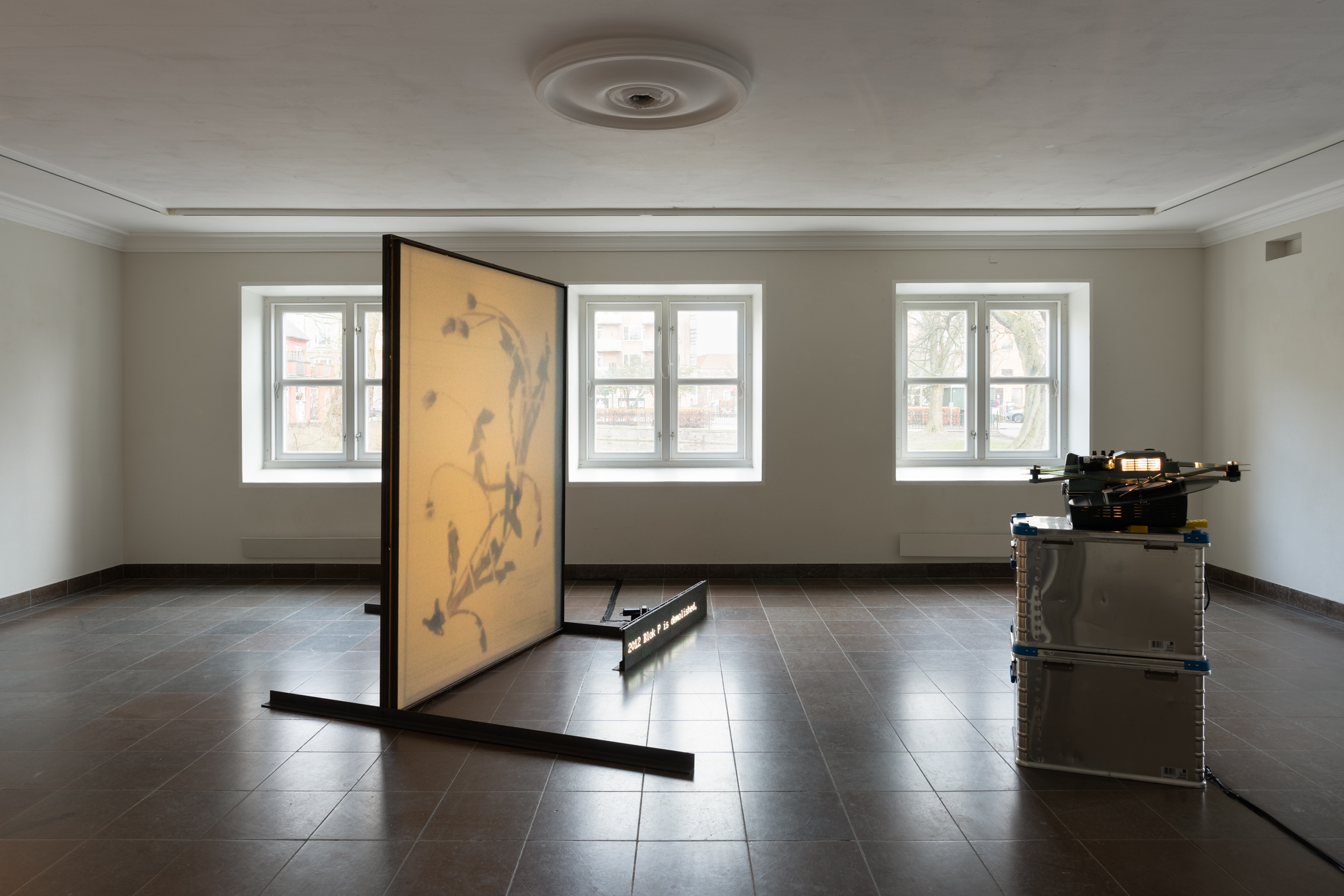Arctic Stations
Collaboration with Eva la Cour
Møstings Hus
February 29 - Extended until Juni 28, 2020
![]()
![]()
![]() In the duo exhibition Arctic Stations, visual artists Tinne Zenner and Eva la Cour utilise visual art and
film to explore the relationship between politics and science in the context of the geopolitical Arctic.
In the duo exhibition Arctic Stations, visual artists Tinne Zenner and Eva la Cour utilise visual art and
film to explore the relationship between politics and science in the context of the geopolitical Arctic.
The exhibition is rooted in a journey to the island of Qeqertarsuaq in western Greenland, which until 1953 was Denmark’s administrative headquarters for North Greenland. Today, the former administration building houses a cultural history museum, while the University of Copenhagen has taken over a research station named Arktisk Station and the Technical University of Denmark runs the magnetic observatory of the island.
Arctic Stations is thus a title referring to the site-specific starting point of the exhibition, but also to its spatial organisation: Three independent film installations serve as artistic articulations of the long standing and multifaceted research work that informs Zenner and la Cour’s collaboration. Regarded not only as the spatial architecture of the exhibition, but also as a kind of historical space, the three installations using 16mm film, reflects upon visual registration practices in botany, geophysics and anthropology. Here, visual registration is not understood as objective or authentic representation, but precisely as a historical effect; mediation of scientific data not understood as neutral dissemination, but as imaging practice.
This approach allows professional vision, gendered positions, personal anecdotes, environment and infrastructure to come to the fore: In other words, Tinne Zenner and Eva la Cour approach scientific practices in Qeqertarsuaq as a continued image of the presence of Denmark in Greenland.
Arctic Stations is a speculation on how complex scientific, institutional, industrial and commercial practices are interconnected and entangled — although science often is regarded as something that can be separated from politics.
Seminar: The Affective Economy of Doing Data
NB: Cancelled due to COVID.
As part of the exhibition, the seminar The Affective Economy of Doing Data is held. The aim is to allow a handful of invited researchers and artists’ work and practice to intervene in the exhibition and its examination of new perspectives on the separation of politics and science. The seminar will be held in English.
With contributions by: Anne Haaning (Doctoral candidate in Artistic Research at UiT, NO), Britt Kramvig (Professor in Turism and Nordic Studies, UiT, NO) Kelton Minor (Doctoral candidate at the Department of Economy, KU, DK) and Kirstine Møller (Doctoral candidate Greenlands at National Museum, GR), Eva la Cour and Tinne Zenner.
Supported by: Statens Kunstfond, 15. Juni Fonden, Frederiksberg Kommune, Statens Værksteder for Kunst & Haki Stillads.
Curator: Sille Brethvad / Møstings Hus
Documentation: David Stjernholm Møstings Hus
Collaboration with Eva la Cour
Møstings Hus
February 29 - Extended until Juni 28, 2020



The exhibition is rooted in a journey to the island of Qeqertarsuaq in western Greenland, which until 1953 was Denmark’s administrative headquarters for North Greenland. Today, the former administration building houses a cultural history museum, while the University of Copenhagen has taken over a research station named Arktisk Station and the Technical University of Denmark runs the magnetic observatory of the island.
Arctic Stations is thus a title referring to the site-specific starting point of the exhibition, but also to its spatial organisation: Three independent film installations serve as artistic articulations of the long standing and multifaceted research work that informs Zenner and la Cour’s collaboration. Regarded not only as the spatial architecture of the exhibition, but also as a kind of historical space, the three installations using 16mm film, reflects upon visual registration practices in botany, geophysics and anthropology. Here, visual registration is not understood as objective or authentic representation, but precisely as a historical effect; mediation of scientific data not understood as neutral dissemination, but as imaging practice.
This approach allows professional vision, gendered positions, personal anecdotes, environment and infrastructure to come to the fore: In other words, Tinne Zenner and Eva la Cour approach scientific practices in Qeqertarsuaq as a continued image of the presence of Denmark in Greenland.
Arctic Stations is a speculation on how complex scientific, institutional, industrial and commercial practices are interconnected and entangled — although science often is regarded as something that can be separated from politics.
Seminar: The Affective Economy of Doing Data
NB: Cancelled due to COVID.
As part of the exhibition, the seminar The Affective Economy of Doing Data is held. The aim is to allow a handful of invited researchers and artists’ work and practice to intervene in the exhibition and its examination of new perspectives on the separation of politics and science. The seminar will be held in English.
With contributions by: Anne Haaning (Doctoral candidate in Artistic Research at UiT, NO), Britt Kramvig (Professor in Turism and Nordic Studies, UiT, NO) Kelton Minor (Doctoral candidate at the Department of Economy, KU, DK) and Kirstine Møller (Doctoral candidate Greenlands at National Museum, GR), Eva la Cour and Tinne Zenner.
Supported by: Statens Kunstfond, 15. Juni Fonden, Frederiksberg Kommune, Statens Værksteder for Kunst & Haki Stillads.
Curator: Sille Brethvad / Møstings Hus
Documentation: David Stjernholm Møstings Hus